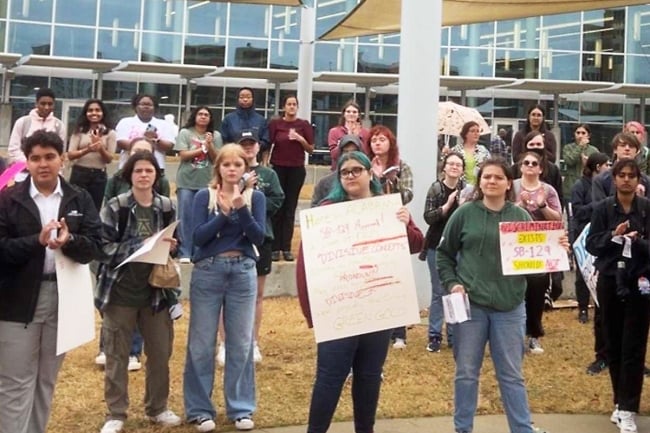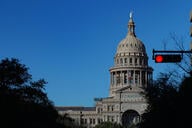You have /5 articles left.
Sign up for a free account or log in.

Students protested Senate Bill 129 Wednesday on the University of Alabama at Birmingham’s campus.
Walker Melson
State lawmakers have been targeting diversity, equity and inclusion efforts for years now. Bills from different states that seek to curtail DEI programs or the spread of arguably DEI-related, so-called divisive concepts—such as the idea that meritocracy is racist—can all seem to blend together.
But Alabama’s Senate Bill 129, which suddenly appeared Feb. 20 and passed the Senate two days later, might break new ground if it ultimately becomes law.
The bill includes provisions curbing DEI programs, “divisive concepts” and even transgender individuals’ access to campus bathrooms. While it’s moved quickly, so have its opponents.
Students have already protested across multiple campuses. And in a major college football state, Birmingham mayor Randall Woodfin posted on X that he would have “no problem organizing Black parents and athletes to attend other institutions outside of the state where diversity and inclusion are prioritized.” He also invoked Alabama’s racist history, adding that “if supporting inclusion becomes illegal in this state, hell, you might as well stand in front of the school door like Governor Wallace.”
But free speech groups have raised a particular concern. They say the measure could limit faculty members’ speech to such an extent that even professors who disagree with the bill’s list of “divisive concepts” couldn’t teach students about these ideas—even to criticize them.
For instance, a professor’s ability to teach about the historical dangers of nationalism, racism or antisemitism could be hamstrung by the fact that one of the “divisive concepts” listed is that “any race, color, religion, sex, ethnicity, or national origin is inherently superior or inferior.” A faculty member could be punished for having students read some of the founding fathers’ racist ideas to understand and critique them, or for having them read about Nazi leaders’ antisemitic, nationalistic ideas or Martin Luther’s criticisms of the Roman Catholic Church.
Jeremy Young of PEN America, a free expression advocacy group, said Senate Bill 129 would be “the most restrictive educational gag order in the country” affecting higher education. Faculty members who don’t comply with the legislation could be fired or face other discipline, the bill says.
Senate Republicans passed it on a 26-to-7 party-line vote. The state’s House of Representatives, which is also controlled by the GOP, now has it in its chamber. The Speaker of the House and the chairman of the committee the bill’s been assigned to didn’t respond to Inside Higher Ed’s requests for comment Wednesday or Thursday; neither did the lead sponsor of the legislation in the Senate, Republican Will Barfoot.
Young, the program director for PEN’s Freedom to Learn program, said only Florida’s Stop the Wrongs to Our Kids and Employees (WOKE) Act is on the same level as the Alabama bill in restricting what can be discussed in classrooms. While Florida Republicans passed that law, federal judges have blocked its impact on universities thus far through an injunction.
Tyler Coward, lead counsel for government affairs at the Foundation for Individual Rights and Expression, another free speech group, said the Alabama bill “is unconstitutional and threatens academic freedom.” He agreed that it appears to ban discussing the “divisive concepts” even in a critical way. Furthermore, even if it didn’t, and it only banned praising them, he said the bill would still constitute viewpoint discrimination.
Division and Confusion
In 2020, the fraught year of the George Floyd protests, then president Donald Trump issued a now-reversed executive order curtailing the teaching and advocacy of “divisive concepts” in executive agencies and the military. Trump’s list of such concepts included, among other things, ideas that the U.S. “is fundamentally racist or sexist” and that anyone “should feel discomfort, guilt, anguish, or any other form of psychological distress on account of his or her race or sex.”
In the years since, Republican-controlled states such as Florida and Tennessee have grabbed the baton, passing laws that limit the teaching of “divisive concepts” in their public colleges and universities.
Like other states’ “divisive concepts” bills, Alabama’s includes a list of what it considers divisive. The list includes the idea that “any race, color, religion, sex, ethnicity, or national origin is inherently superior or inferior” and the notion “that fault, blame, or bias should be assigned to members of a race, color, religion, sex, ethnicity, or national origin, on the basis of race, color, religion, sex, ethnicity, or national origin.”
The legislation goes on to prohibit various things surrounding these ideas. For instance, a public higher education institution or a local school board wouldn’t be allowed to “direct or compel a student, employee, or contractor to personally affirm, adopt, or adhere to a divisive concept.”
But then comes what Young highlighted as particularly problematic: the mention of “course work” in a line that says public colleges and universities and school boards can’t require students “to attend or participate in any … training, orientation, or course work that advocates for” a divisive concept.
“By phrasing it that way, they have essentially turned this bill into the most restrictive type of gag order,” Young said. He noted that coursework includes assigned readings, meaning the bill could ban assignments to read works by authors talking about their own experiences with racism—if those works were considered to be advocating for a divisive concept.
The bill does include multiple exceptions. One significant-seeming carve-out regarding teaching says the bill wouldn’t ban a public college from authorizing “teaching or discussion of any divisive concept in an objective manner and without endorsement as part of a larger course of academic instruction, provided the institution and its employees do not compel assent to any divisive concept and otherwise comply with the provisions of this act.”
But Coward said this carve-out “doesn’t really do the job.” Academic freedom includes the ability for faculty members to take positions in class, he noted, and the bill doesn’t define what “objectivity” means. The exemption leaves it “unclear to faculty what they can or cannot say in the classroom,” he said.
Young said it’s unclear, from past precedent, whether courts will interpret this exception as overriding the earlier part of the law that bans discussion of divisive concepts. He said he’s not convinced the exception has any impact.
Matthew Hudnall, president of the University of Alabama at Tuscaloosa’s Faculty Senate—who stressed that he was speaking on his own behalf as a citizen—said he thinks these readings of the bill regarding teaching are incorrect. He said he thinks professors could teach about these “divisive concepts” under the bill as long as they aren’t demanding students’ “assent.” But he still opposes the legislation.
Aside from what he called a threefold attack on academic freedom, diversity and restroom access, Hudnall said the bill is a bad look for a state with a long history of racism, slavery and segregation.
“Effectively, it’s not an image that many faculty want to have for the state of Alabama,” he said.
Students Fight the DEI Ban
On the DEI front, the legislation would ban public higher education institutions from sponsoring “any diversity, equity, and inclusion program” or maintaining “any office, physical location, or department that promotes diversity, equity, and inclusion programs.” The bill defines DEI as “any program, class, training, seminar, or other event where attendance is based on an individual’s” race, sex, gender identity or other demographics, “or that otherwise violates this act.”
Student, staff and faculty groups could host DEI “programs or discussions that may involve divisive concepts, provided that no state funds are used to sponsor these programs.” But they would have to publicly state who did sponsor the event, including in any ads.
The bill's wording is vague. Young, from PEN America, said he reads it as a prohibition on state funding for some DEI programming, though not for DEI offices themselves—and that it’s unclear whether student tuition money would be considered state funding. (Note: This paragraph has been clarified to better represent Young's view of the bill.)
Regardless, students, faculty members and others are taking the threat to DEI seriously. On Wednesday, University of Alabama at Birmingham students rallied on campus against the legislation, and protests also occurred at other public universities as part of ongoing collaboration among students across the state against the legislation.
Raimi Liebel, a UAB student, said she was tracking bills as a policy intern for a local LGBTQ+ community center when she saw the legislation appear. She said it was 4:45 p.m. on Tuesday of last week.
“We were in shock,” Liebel said. “It was unlike any of the other bills I’d seen this session.”
She said the bill would cut funding to both of the student groups she’s an officer of, as well as many other groups.
“Immediately we knew we had to act,” she said.
She started a petition that had more than 5,000 signatures as of Thursday night and said that more than 120 students, faculty members and community members were involved in Wednesday’s protest on her campus.
“DEI offices as well as student organizations related to quote unquote ‘divisive concepts’ are based on our identities,” she said. “These organizations and offices are often the first or only place that we can find community on our campuses, so having these offices, programs removed and organizations lose their state funding would ultimately mean that people will not come to UAB.”
Miguel Luna, another UAB student, said he grew up in Leeds, Ala., near Birmingham, the child of Mexican immigrants. UAB’s DEI office helped him and a couple of other students start a group called Esperanza—Spanish for “hope”—devoted to uplifting other Hispanic and Latino students. But the bill threatens its funding, he said.
“I really just think that this bill is very harmful to other people like me,” he said.
And it’s not just students. Woodfin, the Birmingham mayor, has been particularly outspoken in opposition to the legislation.
“Just on its face it’s offensive,” Woodfin told Inside Higher Ed. He said while Alabama’s George Wallace era featured overt racism, this bill pushes sexism and “every other -ism as it relates to every other group that’s not white men.”
Diversity and equity are the opposite of divisive, Woodfin said. “It’s actually welcoming everybody, and so I don’t like how politically something that’s neutral on its face—to make sure, with public tax dollars we are including all—you can hijack that and make it illegal.”




